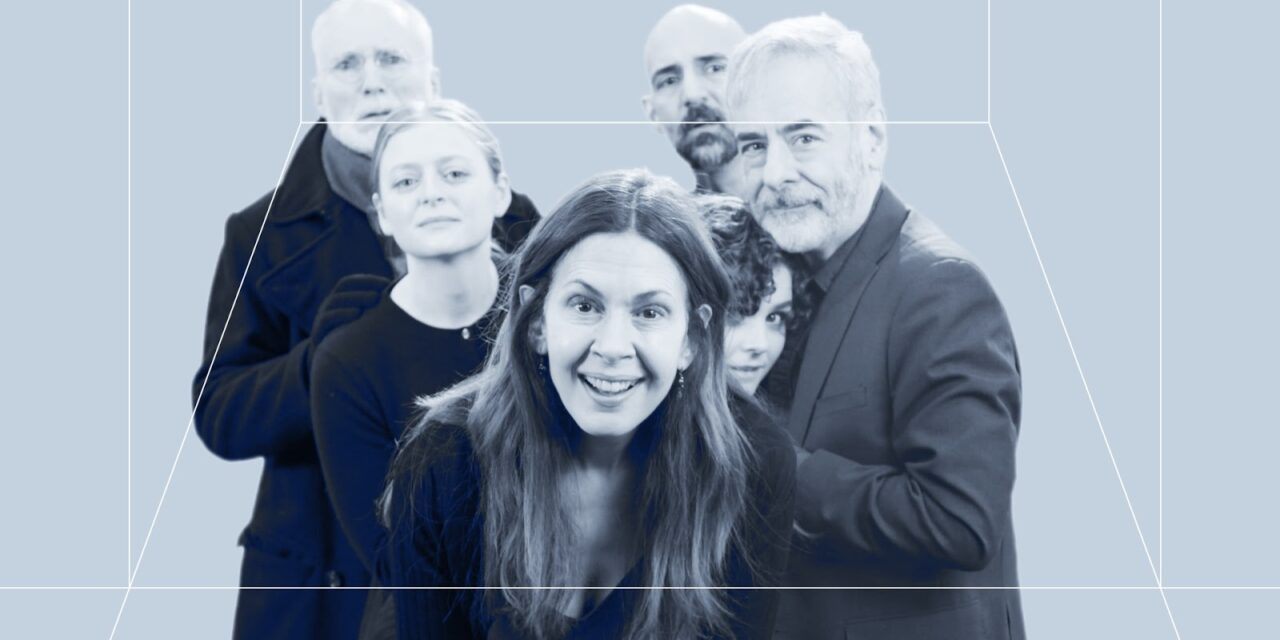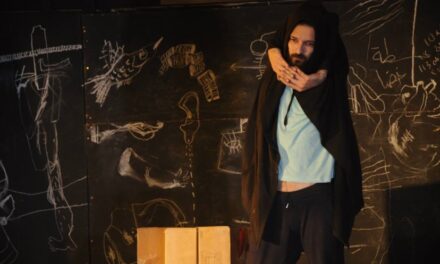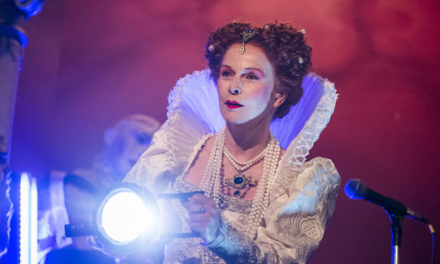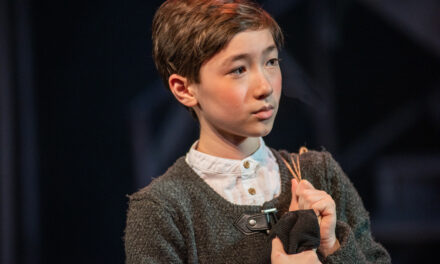Igor Golyak is the Artistic Director of Arlekin Players Theatre. Arlekin Players Theatre has embraced virtual theatre during the pandemic, and their upcoming show, chekhovOS/an experimental game/, has recently announced May and June performance dates for all over the world. It is also part of the 2021 IOTF: International Online Theatre Festival. I had the pleasure of speaking with Igor about the creation of Zero Gravity Lab, their upcoming productions, and his hopes for the future of virtual theatre.
Victoria Isotti: For readers who might not be familiar, can you tell me about yourself and your work?
Igor Golyak: I went to school as an actor in Moscow, and then I got my master’s degree in directing at the Russian Academy of Theater Arts. I came over here in 2004 and started a theatre school, and then ultimately started a theatre company in 2010. Since then, I’ve been creating plays. We started out as a small immigrant theatre company and it still remains a small immigrant theatre company. A lot of the plays we’ve been making were in Russian, so we were hidden from the American theatre scene until about three years ago when we did a bunch of plays in English, and then won the Eliot Norton awards for best production, best actor, and best director. Since then it’s been blowing up. Then we had State vs. Natasha Banina, which is the first show that we created on Zoom. Now, we’ve launched the Zero Gravity Virtual Theater Laboratory. We converted our theatre space into a green screen studio for virtual theatre, and this is the first project in that space.
VI: How did the idea for the Zero Gravity Lab come about?
IG: It came about after the success of State vs. Natasha Banina, which we actually toured that show around the world and went to a bunch of theatres and festivals that presented it. We understood that we found something that seems to be interesting as a virtual theatre approach, and decided to branch off our main theatre company and start a separate stage called the Zero Gravity Laboratory.
VI: Can you talk more about State vs. Natasha Banina and the creative process for this production?
IG: State vs. Natasha started when we were locked in. My partner and I were locked in the same apartment during the pandemic, and we decided to continue exploring how theatre could look in the pandemic. We came up with the concept for State vs. Natasha, which ultimately led to the chekhov/os project because Mikhail Baryshnikov had come to see it four times, then he presented it at his Art Center. Then Jessica Hecht had come and seen it and we connected through that production. People connected with me and we started exploring other possibilities for virtual theatre. But, the initial start to virtual theatre, in general, was the pandemic. State vs. Natasha Banina was done in our living room, so we toured the world out of our living room for six months.
VI: That’s amazing. How was scheduling a whole tour from your living room?
IG: It was okay. We have a two-year-old son and a dog, so a lot of the time when we did our shows we would present the show at eight o’clock so that they were asleep. For our shows in Europe, we had to present the show during the day, so we asked the grandparents for help and they took our son to babysit. So it worked out fine. It was fun! It was a small team of myself, my partner, and my sister, who was helping with running the show. But it was done out of a real living room and nobody could tell until we showed it to them at the end of the show.

VI: Can you tell me more about the initial inspiration for chekhovOS/an experimental game/?
IG: The inspiration came when we connected with Jessica Hecht and started speaking about collaborating in this virtual theatre world. I suggested that she would be great for The Cherry Orchard. She brought a bunch of her friends, I bought in some of my company members, and we did a reading last summer. We met a couple of times to rehearse and then we did the staged reading of The Cherry Orchard to experiment with how relevant it is to this day. We found it was very relevant to the fact that during the pandemic there was a huge sense of loss and a huge sense of the fragility of human life that was in the air, and that is very much present in The Cherry Orchard, which Chekhov was writing as he was dying. That connection drew us to this play and inspired us to dig more. We started planning a recording of some of the scenes when Mikhail Baryshnikov, who is now playing Chekhov in this production, became interested in this project. He generously offered the Center for the recording of some of the Chekhov scenes, so we brought in a cast of seven or eight people and we rehearsed for three days and we shot for three days. Then we edited them in February and shot Mikhail Baryshnikov separately at his apartment. We had the first sharing, which was very much an initial iteration of this of the show. Since then, we’ve been continuing to work on it and rethink some of the aspects of the show. Now, we are ready to present the next iteration of this virtual production as phase two of this big project. We ultimately would like to open this show in New York next spring as a virtual and in-person production simultaneously.
VI: I know that this show uses live performance, film, and video game elements. Can you tell me more about the blending of this media?
IG: We’re wondering, how is this different from a movie or a Netflix show? One of the most important elements of this is that the audience feels like they have a role to play. And that reminds us very much of a gaming experience, where the audience members have a role to play in the whole experience. We contacted Will Brierley, who helped us with some of the gaming elements. We filmed some of the scenes, and some of the show is happening live, so all of these elements are coming together in this production and this experiment.
VI: Can you tell me more about the role the audience will be playing throughout the show?
IG: They’re going to be trying to save characters that are stuck in the Chekhov operating system, which is a system of belief or a system of Chekhov and his view of life. These are characters who are looking for happiness and never finding the happiness they’re looking for, or looking to make choices but not being able to make choices. Our idea is that the characters themselves are tired of being unhappy and need the audience to help save them, but the audience can save them only if they have changed. The characters address the audience members in helping choose the order of the scenes, what play they’re seeing, and ultimately making a choice in trying to help the characters. So they’re kind of like saviors. They’re making this choice whether to save or not to save.
VI: You decided to make this show free to view all over the world and are asking for donations. Is there a specific reason as to why you made this decision?
IG: Well, this is an experiment and we’re looking to develop this genre, so we are asking for donations. One of the advantages of virtual theatre is the fact that it democratizes theatre for anyone to see. People can see it from anywhere, so we really want to lean into the idea of equity and theatre and the fact that the more people that get a chance to experience it, the more they would be interested in coming to a physical theatre space. But I think that the initial expense that they have to spend is a real obstacle to people coming to the theatre so we’re experimenting with that.

VI: I know you currently teach at Boston Conservatory at Berklee. Has your teaching there influenced your work with Arlekin Players Theatre?
IG: It has informed it. I’ve been able to experiment with some of the classes and I think some of the results of classwork that had to be virtual during the semester at Boston Conservatory really influenced how I looked at virtual productions. Also, my students have been able to benefit from the fact that I’ve been researching this and really diving into trying to understand it, whether it is virtual theatre, doing classes on Zoom, doing acting training on Zoom, or doing scenes on Zoom.
VI: What are your hopes for the overall future of virtual theatre?
IG: I think that there’s an opportunity to develop theatre in this venue. I would say virtual theatre is a venue for theatre just like a bus stop can be a venue for site-specific theatre, or an actual theatre, or a black box. Just like that, virtual theatre is a venue for theatre. The difficulty with virtual theatre is that it hasn’t been experimented with enough and we need to learn more about it. I think there are a lot of advantages with equity and the democratization of theatre and just having more access to the theatre. But there’s also the obstacle that nobody knows how to do it right, which is what we’re trying to discover in our virtual theatre.
VI: Is there anything else you would like to add?
IG: I’m really looking forward to discovering what is possible. There are a lot of obstacles, but there are also a lot of advantages to this virtual space. We are looking to continue this exploration and adding this venue of virtual theatre space to our performance venue outlets. I would love to do shows in-person and I would love to explore more shows in the virtual world. So now our theatre has gotten two stages: we will have an in-person stage venue and a virtual stage. I think there’s a lot of potential there.
You can watch the show live on Sunday, May 30, 11 am ET / 5 pm CEST as part of the IOTF. Free for all everywhere in the world, but you need to pre-register here.
This post was written by the author in their personal capacity.The opinions expressed in this article are the author’s own and do not reflect the view of The Theatre Times, their staff or collaborators.
This post was written by Victoria Isotti.
The views expressed here belong to the author and do not necessarily reflect our views and opinions.


















